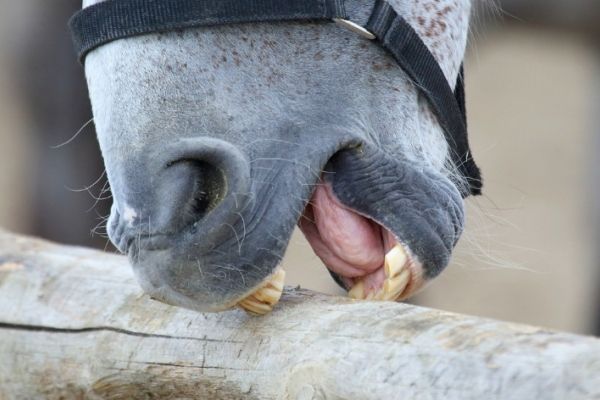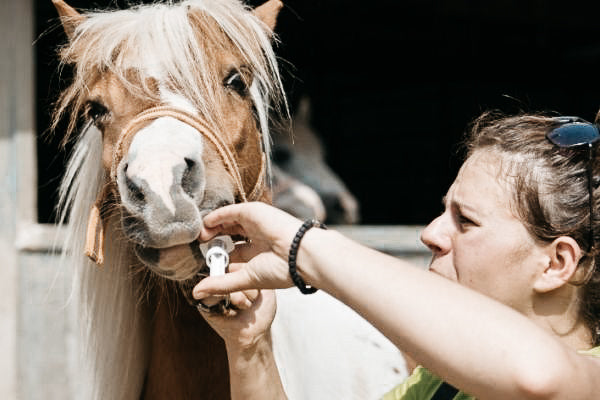
Cribbing on horses – interesting facts about the topic!
Let me tell you one thing in advance: It's not a pretty scenery, but ultimately it's not the end of the world either! It is not a real horse disease due to health problems! Let us rather describe it as a coping strategy on the part of the animal to various stressful influences. More on that later!
In fact, according to expert statistics, around one to eight percent of all horses copulate. However, if it can be avoided, all the better. But be careful: advertised belts are not necessarily the right way to help the affected animals. Interesting? We think, yes!

What actually happens when you crib?
There are two forms of cribbing in horses. The former is attachment coupling. The animal opens its throat by tensing its throat muscles and draws air into the esophagus. Many of these horses use a horizontal object (e.g. b the feeding trough, box doors or wooden fences) for this. They put on their front teeth. This makes this mechanic easier for them. The typical Kopperton (a burping noise) then occurs.
The second variant is free copying. To do this, the horse skillfully pulls its head and neck towards its chest and then snaps back again. Accordingly, Freikoppers do not need any “auxiliary” items. A cribbing horse is not the same as a cribbing horse.
The effect when the horse copulates appears to be addictive for the animal. Their body releases its own substances that calm the horse. There is supposed to be evidence that even the heart rate drops when the animal suffers from its horse sickness (in goose feet!).
It used to be assumed that cribping made the horse sick. There should be gas accumulation in the stomach and intestines. It has also been claimed that a horse that copulates is more likely to have colic. Thanks to veterinary examinations, this has been refuted. Only the incisors are affected with attachment coppers. Wear and tear is often visible. The neck muscles can also be significantly more pronounced. However, these are not really harmful to the animal.
What causes a horse to copulate?
Coping on horses is no coincidence. Of course there are reasons. These should be eliminated if possible to make things easier for the horse! In some cases this can help.
The first point is the housing conditions. You know your horse is a running and herding animal. The wonderful creature simply needs certain conditions to be happy and of course to remain mentally healthy. Sufficient free(!) exercise area in the fresh air, physical contact with others like him, enough roughage and your care/love!

Ask yourself if you want to stand in a barred box for 20 hours a day? You maybe You are exercised for 1 hour a day, given rationed food and then given 3 hours of paddock free time every day. Is that enough for a creature that (naturally!) spends up to 16 hours a day looking for food and spends approx. Covered 40 km of distance with his peers?
The next problem as to why a horse could be cribbing is an existing horse disease. Studies in England found that many Koppers had previously suffered from diseases of the stomach and intestinal tract (ulcers.) suffered. Often caused by too much concentrated feed and too little roughage.
Other triggers can be excessive pressure to perform, dubious training methods and drastic negative experiences (dropping out, for example). By the way: imitating Koppen has not been confirmed!
As a final point, it must also be mentioned that cribbing in horses is definitely hereditary. So again, not as a horse disease in the health sense, but really due to genetic predispositions. This means that the horse can also cripple, even though it has good keeping conditions, has received gentle training and has a loving owner. You shouldn't lump the whole story together!
What helps against cribbing in horses?
Kopping horse therapy - three terms that many horse lovers want. First and foremost, it is important to consider whether the animal lives in a species-appropriate manner, whether the amount of roughage is appropriate and where there could be possible stressful situations for the horse. Unfortunately, it is often the case that the horse continues to cop even when the posture is optimized. Here it is important to provide the hottie with all-round employment. In the form of toys, hay bags and of course lots of horse buddies. Possibly. His pleasure in copping is then minimized.
Getting control of cribbing in horses with therapy cribbing straps usually means even more stress for the horse partner and borders on animal cruelty. The “horse disease” is only being suppressed even more. Horse no longer cops all the time - but now has to cope with his addiction psychologically. Not recommendable!
Resulting, short answer to: What helps against cribbing in horses?
The affected animals simply need an understanding owner who pays attention to their basic needs and ultimately accepts them as they are!

Discover more posts

With the start of the grazing season, horse owners are dealing with a vexing issue of horse care: deworming horses. Worms can occur in horses not only in summer, but at all times of the year. ...
Continue reading
Rimondo Podcast – Interview with Animalon
Our first interview at Rimondo On the 20th05.In 2019, the Animalon team made their way to Rimondo in Münster. There we were invited to our very first interview and were really lookin...
Continue reading
